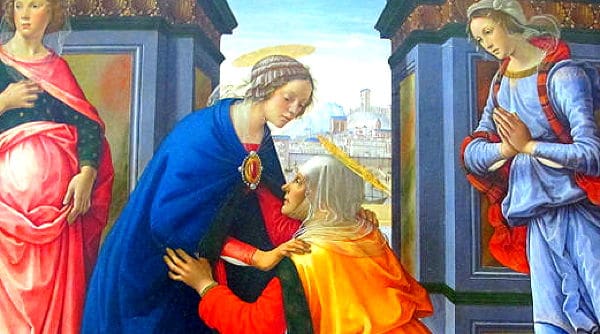The Visitation of the Blessed Virgin Mary
Feast
Today’s feast, The Visitation of the Blessed Virgin Mary, invites us to appreciate Our Lady’s own understanding of God’s mercy. By reflecting on Our Blessed Mother’s visitation to her cousin, Saint Elizabeth, the Virgin Mary, who is called “Mother of Mercy”, can help us understand God’s great mercy and love for us.
Venerable Archbishop Fulton J. Sheen tells us in his book Life of Christ, that:
Mary was given a sign that she would conceive by the Holy Spirit. Her cousin Elizabeth already had conceived a son in her old age, and was now six months pregnant [cf Luke 1:36]. Bearing the Divine Secret within her, Mary then traveled several days’ journey from Nazareth to Hebron where, traditionally, the remains of Abraham, Isaac and Jacob lay. Elizabeth, who somehow knew mysteriously, that the Blessed Virgin was bearing the Messiah, cried out:
Most blessed are you among women, and blessed is the fruit of your womb.
And, how does this happen to me, that the mother of my Lord should come to me?
(Luke 1:42-43)
This greeting came from the mother of the herald of the Word to the Mother of the King whose path the herald would prepare. John the Baptist “still cloistered in his mother’s womb” leaped for joy at Jesus and His mother, who brought the Christ to their home.
Our Blessed Mother responded to Elizabeth with her Magnificat song of joy, extolling what God had done for her and praising His mercy, His strength, and His compassion. Retracing the history of Israel back to Abraham, she celebrated God’s plan in preparing for this moment from one generation to the next. And, she also looked into the future and prophesied: that all would call her “Blessed” and that the Messiah was on His way. God was fulfilling His prophecies and was about to manifest Himself on earth, in the flesh, to all mankind. Her praise of His mercy and justice was also a prophecy of the qualities that Christ would enflesh. She ends her hymn of praise by proclaiming the revolution He would set in motion by unseating the mighty and exalting the humble [adapted from Life of Christ].
Providentially, Sister Elena Bosetti S.J.B.P. also wrote this some time ago in her book Luke:The Song of God’s Mercy – A Contemplative Reading of the Gospel:
“The Magnificat sings the story of divine mercy, which bestows itself in many forms: toward the mothers of Israel and toward their sons, in fidelity to the promise made to their father Abraham, in whose name the canticle closes. Mercy, the divine eleos, [or hesed] is therefore the guiding theme of the Magnificat, the golden thread that connects Mary’s situation to that of Israel…. [N]ot by chance [does] the ending of the Magnificat [contain] two [particularly relevant] points [on mercy]: verse 50, which serves as a bridge between Mary’s personal situation and that of the community, and verse 54, at the end of the sevenfold salvation of Israel:
‘And his mercy is from generation to generation toward those who fear him’
(v 50)
‘He has come to the aid of his servant, Israel, mindful of his mercy’
(v 54)
Finally, what God did in the Blessed Virgin, He mercifully, albeit differently, does in us. And, Servant of God Monsignor Romano Guardini, in his book The Rosary of Our Lady, beautifully explained it like this:
In every Christian life there is a sacred domain of nascent growth in which dwells Christ — a domain in which we are more firmly rooted than we are in our own. There He works and grows, takes possession of our being, draws our strength toward Himself, penetrates our thoughts and volition, and sways our emotions and sentiments, so that the word of the Apostle comes true:
“It is now no longer I that live, but Christ lives in me”
(Galatians 2:20)
As we can see, this is, indeed, a wonderful feast on which to meditate on God’s mercy: what He did in Mary, our Mother; what He did for humanity; and what He has done and is doing, individually, for each one of us. Let us not let this day pass without praising His mercy and giving thanks to Him whose “mercy endures forever” (cf. Psalm 136).
+
Art for this post on the Feast of the Visitation of the Blessed Virgin Mary: Visitation, Domenico Ghirlandaio, 1491, PD-US author’s life plus 100 years or less, Wikimedia Commons.





